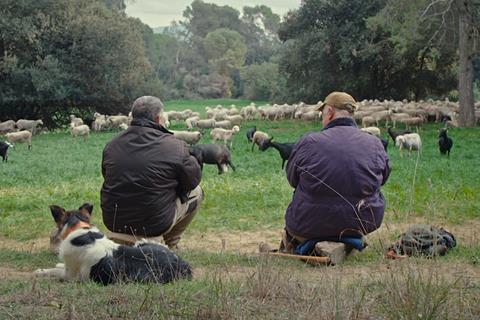A goat-herd and a high-tech research lab in rural Spain provoke this exploration of the connection between man, nature and science

Set in a rural area in the outskirts of Barcelona, Pau Faus’s keen-eyed, witty and compassionate second documentary Fauna, which comes to Visions du Reel via a Hot Docs premiere, juxtaposes the life of a local goatherd and life in a nearby research laboratory to explore the tangled contemporary relationship between man, nature and science. It’s a theme which the pandemic brought very much to the fore and is handled by Faus with enjoyably light touch, gently lacerating our absurdities while keeping a compassionate eye on the fascinating and unfathomable contradictions that make us who we are.
Carefully edited so the multiple transitions between its two worlds feel seamless,
The film is topped with a lofty quote from French philosopher George Bataille – ”Truth has only one face, that of a violent contradiction” – and Faus had the good fortune to find this contradiction playing out on a single small parcel of land in the Catalan countryside. We first encounter aging goatherd Valeriano as he rescues a stray animal in his beautifully-shot rural home. But suddenly we draw back from the scene and find ourselves observing through a window in the second of the film’s contrasting worlds: a research laboratory where the hunt is on for a Covid-19 vaccine.
A door opens in the lab, and from it emerges a herd of goats, making their way unsteadily along a corridor. (Later they will be followed by sheep and piglets.) Perhaps the goat just rescued by Valeriano is in the herd? But then a scientist sternly and heartbreakingly informs us that nothing leaves the laboratory alive except people, and suddenly we have found the first of the contradictions that the director is here to unpick – that in the name of saving lives, animals are being raised to then be killed.
Fauna shuttles between the two worlds. Valeriano has a disease of the joints which is causing him pain, and has to take lots of pills – presumably, pills that might have been made in such a lab as this. So here is another of those circular contradictions: Valeriano may be raising goats to sell to a lab which is using them for the kind of research that creates the pills that Valeriano needs to keep him going and get rid of the pains caused by his years of herding goats. We are linked to nature in ways that we’re perhaps unaware of.
Back in the fields, Valeriano neatly reflects that he and his elderly shepherd companion are living in the Stone Age, while inside the lab they are living in the Space Age. (The dialogue sounds more spontaneous at certain moments than at others, when the characters are being used as mouthpieces for the directors’ ideas.) In contrast to with the green tones and soft hues of the leaf-strewn countryside, Faus plays up the lab’s science fiction visuals – cold, angular, and inhabited by people in anonymous protective clothing. We see things there through the eyes of the amiable Julia, a long-time lab assistant who provides us with an interesting insider view of the multiple frustrations of vaccine-hunting.
Fauna is thus not so much a polemic based on the cruelty inflicted on animals by scientific testing; indeed, it seems not to want to address such conflictive issues too directly, apart from one unsettling sequence explaining how the animals’ bodies are disposed of. It is framed more as an objective, witty enquiry into how the puzzling contradictions of humans inflict damage on the natural world in general – and that includes human beings themselves, represented by the endlessly suffering Valeriano.
Carefully edited so the multiple transitions between its two worlds feel seamless, Fauna features several memorable scenes: one showing the messy birth of two kid goat and another, repeated, showing Valeriano and his herd passing under a bridge while on the highway behind them, cars race away in the opposite direction. As obviously metaphorical as such scenes may be, Faus’ sharp and caring eye prevents them from feeling too heavy-handed.
Production companies: Nanouk Films
International sales: Taskovski Films acquisitions@taskovskifilms.com
Producers: Sergio Cameron, Ventura Durall
Screenplay: Pau Faus, Sergi Cameron, Julia R. Aymar
Cinematography: Carlota Serarols
Editing: Julia R. Aymar
Music: Israel Marco, Quim Ramos
























